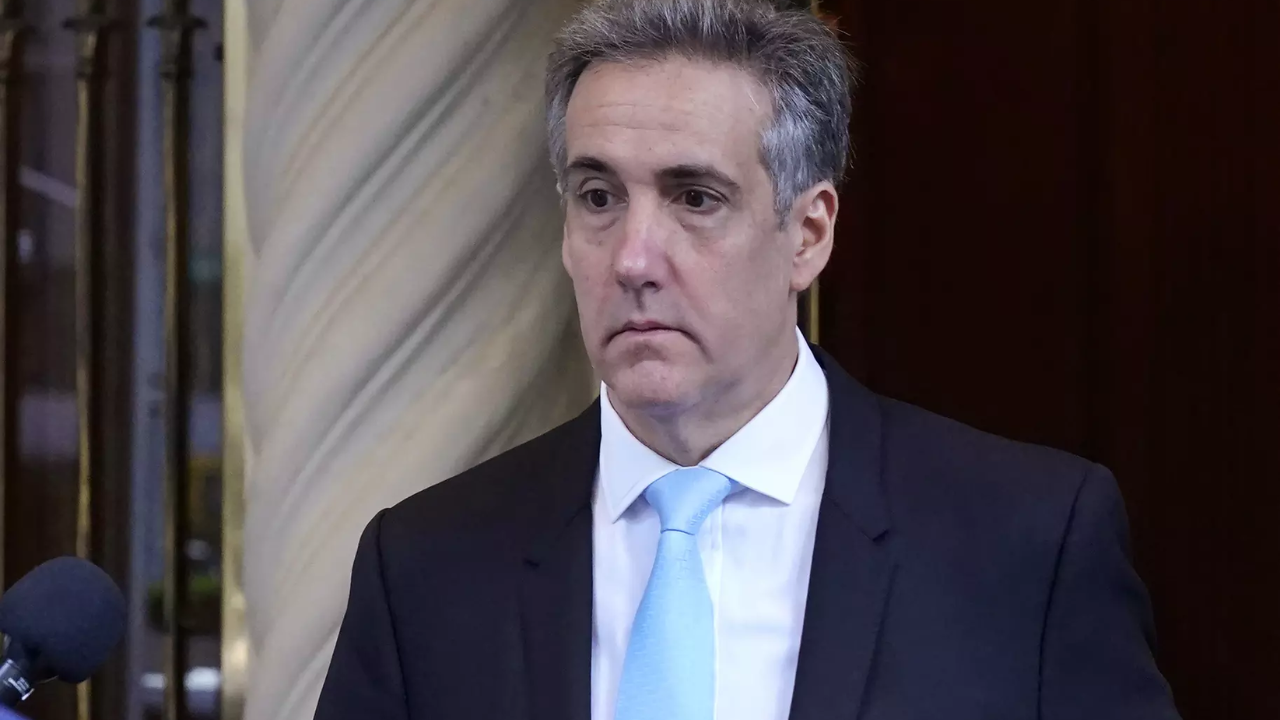[ad_1]
Cohen, the prosecution’s star witness at Trump’s criminal trial in New York, also acknowledged lying on multiple occasions – including under oath – but emphasized that he did so out of loyalty to Trump, as prosecutors sought to pre-empt an expected defense attack on Cohen’s credibility.
In his first day as a witness on Monday, Cohen laid out in painstaking detail how Trump ordered him just before the November 2016 election to pay the adult film actress Stormy Daniels – “Just do it,” Cohen remembered Trump saying – to keep her story about an alleged 2006 sexual encounter under wraps.
Cohen’s $130,000 payment in October 2016 is at the heart of Trump’s historic trial, now in its fifth week.
Trump, 77, the 2024 Republican presidential candidate, has pleaded not guilty and denies any sexual encounter with Daniels. He has characterized the case as a partisan attempt to interfere with his campaign to take back the White House he lost in 2020 to Democratic President Joe Biden.
Prosecutors say Trump paid Cohen back after the election by creating false records indicating they were for legal fees. Those disguised reimbursements provide the basis for the 34 counts of falsifying business records that Trump faces.
In testimony on Tuesday, Cohen recounted an Oval Office meeting in February 2017 where Trump told him that Cohen would soon receive the first monthly installments of a bonus package, which Cohen said included reimbursements for the Daniels payment.
Prosecutor Susan Hoffinger walked Cohen through a series of invoices and checks – some signed by Trump himself – that Cohen said were falsely marked as paying to retain him for legal services.
“There was no retainer agreement, was there?” Hoffinger asked.
“No, ma’am,” Cohen replied.
Cohen, 57, said he lied multiple times to Congress during an investigation into Trump’s Russia ties, eventually pleading guilty to perjury. He also told jurors he lied repeatedly about the payment to Daniels, telling journalists Trump had no involvement.
In 2018, after the Justice Department began investigating the Daniels payment, FBI agents raided Cohen’s home. He said he called Trump in a panic.
“He said to me, ‘Don’t worry, I’m the president of the United States, there’s nothing here, everything is going to be OK, stay tough, you’re going to be OK,'” Cohen said. That was the last time they spoke directly, Cohen added.
Instead, Cohen testified, a lawyer named Robert Costello who was close to Trump adviser Rudy Giuliani offered a “back channel” to Trump. In emails shown to jurors, Costello passed along Giuliani’s assurances that he was loved and had “friends in high places.”
Meanwhile, Trump was defending Cohen on social media and decrying the idea that he might “flip” and cooperate with prosecutors. It all added up to a “pressure campaign” to keep Cohen in line, he said.
But he eventually decided to cooperate after speaking with his family. “It was about time to listen to them, to be loyal to my daughter, my wife, my son and the country,” Cohen said.
Cohen pleaded guilty to federal crimes in 2018, including offenses related to the Daniels payment, and said Trump – who was not charged – directed him to make the payment.
His checkered history is sure to draw a bruising cross-examination from Trump’s lawyers, who have already cast him as a liar and convict who cannot be trusted.
‘A total disaster’
A day after several Republican lawmakers attended the trial in support of Trump, US House Speaker Mike Johnson joined him and later criticized the case outside the court.
While Cohen testified on Tuesday, a mid-level appeals court denied Trump’s latest effort to throw out a gag order that Trump asserted violated his right to free speech.
The order, imposed by Justice Juan Merchan, who is overseeing the trial, prohibits Trump from making public comments about jurors, witnesses, and families of the judge and prosecutors if meant to interfere with the case.
On Monday, Cohen said Trump approved multiple payments to keep damaging sex-scandal stories out of the public eye, lest they torpedo his presidential campaign.
“Everything required Mr. Trump’s sign-off,” Cohen said.
Cohen said that he, Trump and tabloid publisher David Pecker had secretly agreed in 2015 to help Trump’s campaign.
That arrangement included a $150,000 payment from Pecker’s company to former Playboy model Karen McDougal to buy her story about a year-long affair she said she had with Trump, Cohen said. Trump has also denied that relationship.
As with Daniels, the intent was to acquire the rights to the story only to bury it, a practice Pecker called “catch and kill.”
In October 2016, Cohen said, he learned Daniels was shopping her story to tabloids. At the time, the Trump campaign was in crisis mode after the release of an audio recording in which Trump bragged about grabbing women’s genitals.
“He said to me, ‘This is a disaster, a total disaster. Women are going to hate me,’ Cohen told jurors Trump had said.
Cohen testified that Trump was solely concerned about the impact Daniels’ story could have on his White House bid – and not, as Trump’s lawyers have suggested, about the effect on his wife and family. That distinction is crucial to the prosecution’s case.
Under New York law, falsifying business records can be elevated from a misdemeanor to a felony if the crime helped conceal another offense. In Trump’s case, prosecutors have argued that the payment was effectively a secret contribution to his campaign, violating federal and state laws.
The Manhattan trial is considered less consequential than three other criminal prosecutions Trump faces, all of which are mired in delays.
The other cases charge Trump with trying to overturn his 2020 presidential defeat and mishandling classified documents after leaving office. Trump pleaded not guilty to all three.
function loadGtagEvents(isGoogleCampaignActive) { if (!isGoogleCampaignActive) { return; } var id = document.getElementById('toi-plus-google-campaign'); if (id) { return; } (function(f, b, e, v, n, t, s) { t = b.createElement(e); t.async = !0; t.defer = !0; t.src = v; t.id = 'toi-plus-google-campaign'; s = b.getElementsByTagName(e)[0]; s.parentNode.insertBefore(t, s); })(f, b, e, 'https://www.googletagmanager.com/gtag/js?id=AW-877820074', n, t, s); };
function loadSurvicateJs(allowedSurvicateSections = []){ const section = window.location.pathname.split('/')[1] const isHomePageAllowed = window.location.pathname === '/' && allowedSurvicateSections.includes('homepage')
if(allowedSurvicateSections.includes(section) || isHomePageAllowed){ (function(w) { var s = document.createElement('script'); s.src="https://survey.survicate.com/workspaces/0be6ae9845d14a7c8ff08a7a00bd9b21/web_surveys.js"; s.async = true; var e = document.getElementsByTagName('script')[0]; e.parentNode.insertBefore(s, e); })(window); }
}
window.TimesApps = window.TimesApps || {};
var TimesApps = window.TimesApps;
TimesApps.toiPlusEvents = function(config) {
var isConfigAvailable = "toiplus_site_settings" in f && "isFBCampaignActive" in f.toiplus_site_settings && "isGoogleCampaignActive" in f.toiplus_site_settings;
var isPrimeUser = window.isPrime;
if (isConfigAvailable && !isPrimeUser) {
loadGtagEvents(f.toiplus_site_settings.isGoogleCampaignActive);
loadFBEvents(f.toiplus_site_settings.isFBCampaignActive);
loadSurvicateJs(f.toiplus_site_settings.allowedSurvicateSections);
} else {
var JarvisUrl="https://vsp1jarvispvt.indiatimes.com/v1/feeds/toi_plus/site_settings/643526e21443833f0c454615?db_env=published";
window.getFromClient(JarvisUrl, function(config){
if (config) {
loadGtagEvents(config?.isGoogleCampaignActive);
loadFBEvents(config?.isFBCampaignActive);
loadSurvicateJs(config?.allowedSurvicateSections);
}
})
}
};
})(
window,
document,
'script',
);
[ad_2]
Source link






